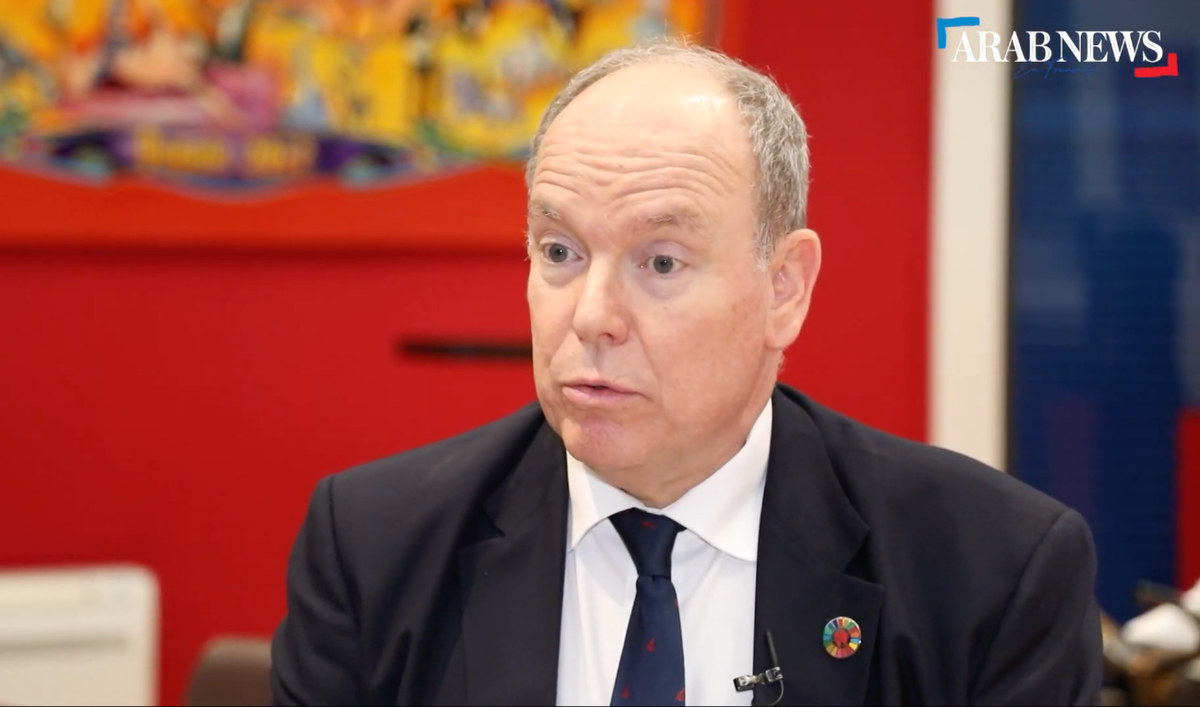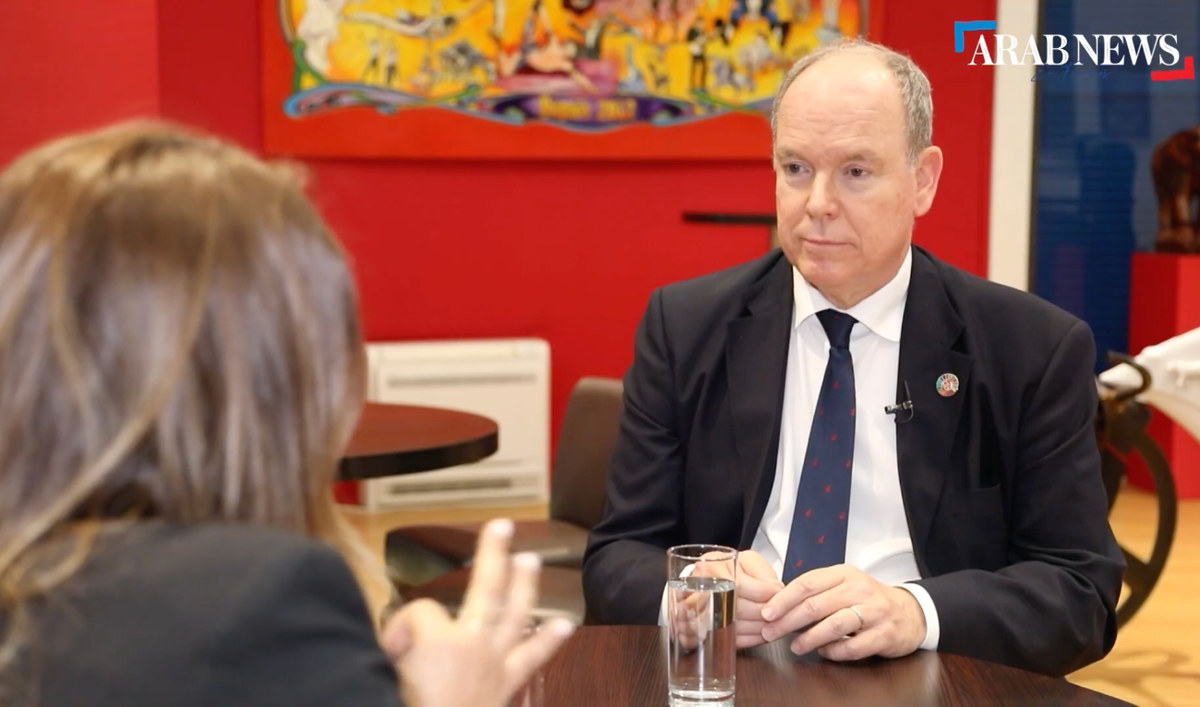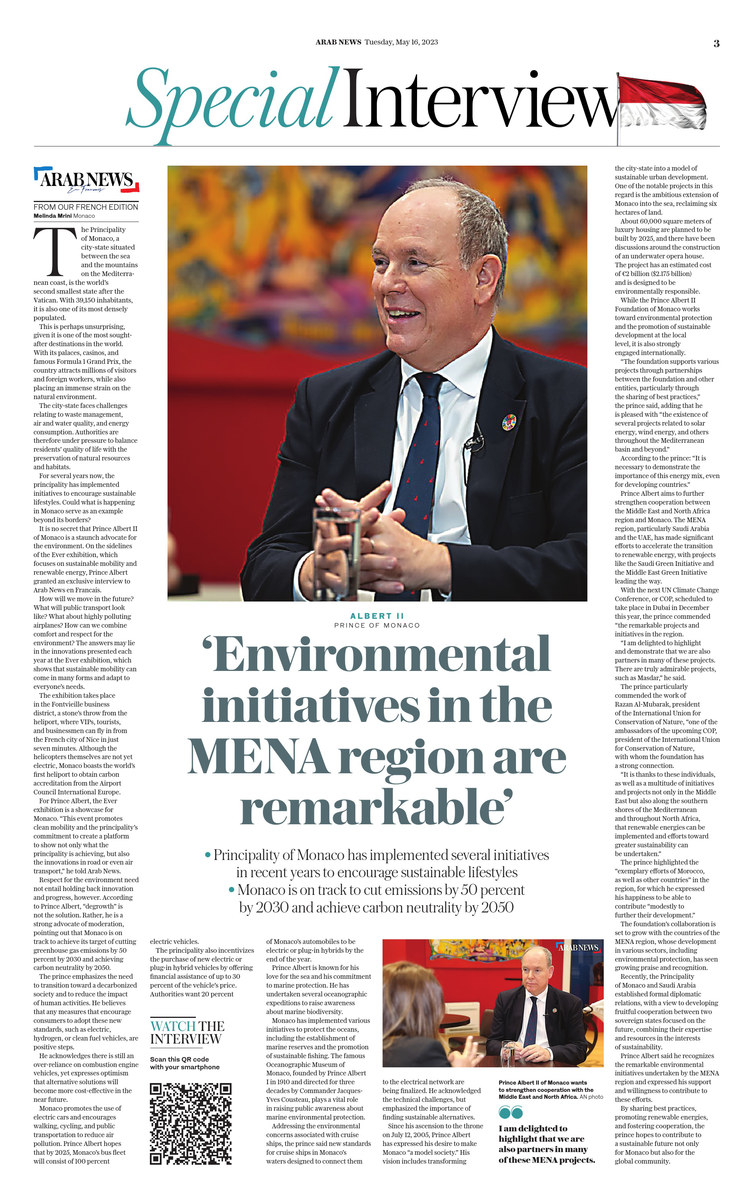 MONACO: The Principality of Monaco, a city-state situated between the sea and the mountains on the Mediterranean coast, is the world’s second smallest state after the Vatican. With 39,150 inhabitants, it is also one of its most densely populated.
MONACO: The Principality of Monaco, a city-state situated between the sea and the mountains on the Mediterranean coast, is the world’s second smallest state after the Vatican. With 39,150 inhabitants, it is also one of its most densely populated.
This is perhaps unsurprising, given it is one of the most sought-after destinations in the world. With its palaces, casinos, and famous Formula 1 Grand Prix, the country attracts millions of visitors and foreign workers, while also placing an immense strain on the natural environment.
The city-state faces challenges relating to waste management, air and water quality, and energy consumption. Authorities are therefore under pressure to balance residents’ quality of life with the preservation of natural resources and habitats.
For several years now, the principality has implemented initiatives to encourage sustainable lifestyles. Could what is happening in Monaco serve as an example beyond its borders?
It is no secret that Prince Albert II of Monaco is a staunch advocate for the environment. On the sidelines of the Ever exhibition, which focuses on sustainable mobility and renewable energy, Prince Albert granted an exclusive interview to Arab News en francais.
A land of sustainable mobility
How will we move in the future? What will public transport look like? What about highly polluting airplanes? How can we combine comfort and respect for the environment? The answers may lie in the innovations presented each year at the Ever exhibition, which shows that sustainable mobility can come in many forms and adapt to everyone’s needs.
The exhibition takes place in the Fontvieille business district, a stone’s throw from the heliport, where VIPs, tourists, and businessmen can fly in from the French city of Nice in just seven minutes. Although the helicopters themselves are not yet electric, Monaco boasts the world’s first heliport to obtain carbon accreditation from the Airport Council International Europe.
For Prince Albert, the Ever exhibition is a showcase for Monaco. “This event promotes clean mobility and the principality’s commitment to create a platform to show not only what the principality is achieving, but also the innovations in road or even air transport,” he told Arab News.
Respect for the environment need not entail holding back innovation and progress, however. According to Prince Albert, “degrowth” is not the solution. Rather, he is a strong advocate of moderation, pointing out that Monaco is on track to achieve its target of cutting greenhouse gas emissions by 50 percent by 2030 and achieving carbon neutrality by 2050.

Prince Albert emphasized the need to transition towards a decarbonized society and to reduce the impact of human activities. (AN photo)
The prince emphasizes the need to transition towards a decarbonized society and to reduce the impact of human activities. He believes that any measures that encourage consumers to adopt these new standards, such as electric, hydrogen, or clean fuel vehicles, are positive steps.
He acknowledges there is still an over-reliance on combustion engine vehicles, yet expresses optimism that alternative solutions will become more cost-effective in the near future.
Monaco promotes the use of electric cars and encourages walking, cycling, and public transportation to reduce air pollution. Prince Albert hopes that by 2025, Monaco’s bus fleet will consist of 100 percent electric vehicles.
The principality also incentivizes the purchase of new electric or plug-in hybrid vehicles by offering financial assistance of up to 30 percent of the vehicle’s price. Authorities want 20 percent of Monaco’s automobiles to be electric or plug-in hybrids by the end of the year.
Monaco on the sea
Prince Albert is known for his love for the sea and his commitment to marine protection. He has undertaken several oceanographic expeditions to raise awareness about marine biodiversity.
Monaco has implemented various initiatives to protect the oceans, including the establishment of marine reserves and the promotion of sustainable fishing. The famous Oceanographic Museum of Monaco, founded by Prince Albert I in 1910 and directed for three decades by Commander Jacques-Yves Cousteau, plays a vital role in raising public awareness about marine environmental protection.
Addressing the environmental concerns associated with cruise ships, the prince said new standards for cruise ships in Monaco’s waters designed to connect them to the electrical network are being finalized. He acknowledged the technical challenges, but emphasized the importance of finding sustainable alternatives.
Since his ascension to the throne on July 12, 2005, Prince Albert has expressed his desire to make Monaco “a model society.” His vision includes transforming the city-state into a model of sustainable urban development. One of the notable projects in this regard is the ambitious extension of Monaco into the sea, reclaiming six hectares of land.
Around 60,000 square meters of luxury housing are planned to be built by 2025, and there have been discussions around the construction of an underwater opera house. The project has an estimated cost of €2 billion ($2.175 billion) and is designed to be environmentally responsible, with careful attention to the site’s biodiversity and the ecological impacts of the construction process.
Monaco and the MENA
While the Prince Albert II Foundation of Monaco works towards environmental protection and the promotion of sustainable development at the local level, it is also strongly engaged internationally.
“The foundation supports various projects through partnerships between the foundation and other entities, particularly through the sharing of best practices,” the prince said, adding that he is pleased with “the existence of several projects related to solar energy, wind energy, and others throughout the Mediterranean basin and beyond.”
According to the prince: “It is necessary to demonstrate the importance of this energy mix, even for developing countries.”
Prince Albert aims to further strengthen cooperation between the Middle East and North Africa region and Monaco. The MENA region, particularly Saudi Arabia and the UAE, has made significant efforts to accelerate the transition to renewable energy, with projects like the Saudi Green Initiative and the Middle East Green Initiative leading the way.
With the next UN Climate Change Conference, or COP, scheduled to take place in Dubai in December this year, the prince commended “the remarkable projects and initiatives in the region.

Prince Albert aims to further strengthen cooperation between the Middle East and North Africa region and Monaco. (AN photo)
“I am delighted to highlight and demonstrate that we are also partners in many of these projects. There are truly admirable projects, such as Masdar,” he said.
The prince particularly commended the work of Razan Al-Mubarak, president of the International Union for Conservation of Nature, “one of the ambassadors of the upcoming COP, president of the International Union for Conservation of Nature, with whom the foundation has a strong connection.
“It is thanks to these individuals, as well as a multitude of initiatives and projects not only in the Middle East but also along the southern shores of the Mediterranean and throughout North Africa, that renewable energies can be implemented and efforts towards greater sustainability can be undertaken.”
The prince highlighted the “exemplary efforts of Morocco, as well as other countries” in the region, for which he expressed his happiness to be able to contribute “modestly to further their development.”
The foundation’s collaboration is set to grow with the countries of the MENA region, whose development in various sectors, including environmental protection, has seen growing praise and recognition.
Recently, the Principality of Monaco and Saudi Arabia established formal diplomatic relations, with a view to developing fruitful cooperation between two sovereign states focused on the future, combining their expertise and resources in the interests of sustainability.
Prince Albert said he recognizes the remarkable environmental initiatives undertaken by the MENA region and expressed his support and willingness to contribute to these efforts.
By sharing best practices, promoting renewable energies, and fostering cooperation, the prince hopes to contribute to a sustainable future not only for Monaco but also for the global community.














